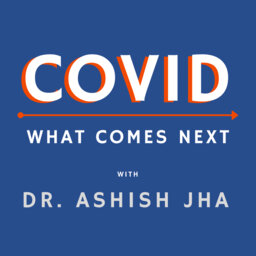Welcome to Episode 22 of “COVID: What comes next,” an exclusive weekly Providence Journal/USA TODAY NETWORK podcast featuring Dr. Ashish Jha, dean of the Brown University School of Public Health and an internationally respected expert on pandemic response and preparedness.
PROVIDENCE – The breaking news overnight that the National Institutes of Health has concerns about the data used by AstraZeneca to prove the reported high effectiveness of its COVID-19 vaccine is not only troubling in its own right but may discourage more people who already were hesitant about getting a shot to get inoculated.
That was Brown University School of Public Health dean Dr. Ashish Jha’s reaction Tuesday morning after the NIH’s National Institute of Allergy and Infectious Diseases, which is headed by Dr. Anthony S. Fauci, issued a cautionary statement from an independent monitoring board that informs the NIH.
That board, Fauci’s division of the NIH wrote, “expressed concern that AstraZeneca may have included outdated information from that trial, which may have provided an incomplete view of the efficacy data. We urge the company to work with the DSMB to review the efficacy data and ensure the most accurate, up-to-date efficacy data be made public as quickly as possible.”
Jha said AstraZeneca “has managed to mess up communication both with the public and with regulatory agencies over and over again… You’ve got to get the facts and data right before you make it public. So it's been very frustrating because they're taking a good vaccine and they're tarnishing it not because the science is bad, but because the communication is so bad.”
Practically speaking, Jha said, the NIH caution will have no immediate impact on residents of the U.S., where the Pfizer, Moderna and Johnson & Johnson vaccines are going into millions of arms each week. AstraZeneca has not received U.S. emergency use authorization.
Nonetheless, Jha said, the latest news could prove further disincentive to Americans who already were reluctant to be vaccinated. And that could have ramifications in months to come.
“AstraZeneca messing things up in this way doesn't help,” Jha said on Tuesday during the 22nd taping of the weekly national “COVID: What Comes Next” podcast. “It doesn't help people feel confident about their vaccine and it doesn't help people feel confident about other vaccines.”
During the taping, Jha also delved into the profound short- and long-term impacts of the coronavirus pandemic on mental health. Substance and alcohol use, suicidal thoughts, depression and anxiety are among the manifestations of the so-called “Second Pandemic,” with roots in the isolation, stress, economic crises and other negative effects of COVID-19.
“A lot of us have been very worried about this,” Jha said. “We are seeing the tip of the iceberg now because people are still in kind of stress mode, ‘get-through-this-crisis’ mode. And we all know that we can get through a crisis by just kind of hunkering down, but when that crisis abates we are going to see this explosion of sentiment and also of effects on mood. I am very worried that we are going to be dealing with the mental health ramifications of this for years and years and years.”
Jha’s advice to people with mental-health challenges? Seek intervention through a primary-care practitioner, psychiatrist, therapist or other qualified healthcare professional.
And in an emergency, dial 911.
More broadly speaking, Jha said states need to prepare, along with physicians and nurses. “I've been talking to healthcare providers across the country and saying ‘you've got to develop a strategy now because you're going to be inundated in three to six months.’ ”
During taping of the podcast, available exclusively from The Providence Journal and the USA TODAY NETWORK, Jha answered three audience questions:
-- “I wonder what he thought of Emily Oster’s article in The Atlantic [last] week, titled “your unvaccinated kid is like a vaccinated grandma.”
Jha thought the substance of the piece with its advice on older peoples’ relationships with children and grandchildren was sound. Jha asserted, however, that the headline left much to be desired.
-- “What do we know about the vaccine and its protection from scenarios where mild or moderate COVID-19 leads to this ‘Long COVID’ phenomena where people are suffering from (sometimes debilitating) symptoms long-term? Will the vaccines protect us from ‘Long COVID’ as well?”
Jha answered in part by saying “We don't know a lot but I will say this: We have not seen much in the way of Long COVID symptoms in people who've gotten vaccinated so far.”
-- A third audience member wanted to know Jha’s guidance for “a vaccinated person with kids who wants to resume social activities with other kids” and for “a vaccinated person who lives with an unvaccinated person.”
The pandemic expert gave a detailed response, urging a degree of caution in various scenarios and concluding “in general, I wouldn’t worry excessively.”
This weekly podcast is hosted by G. Wayne Miller, health reporter for The Providence Journal. To get a deeper understanding of the issues and questions addressed during this 22nd episode, please download the podcast.
 COVID: What comes next - With Dr. Ashish Jha
COVID: What comes next - With Dr. Ashish Jha


